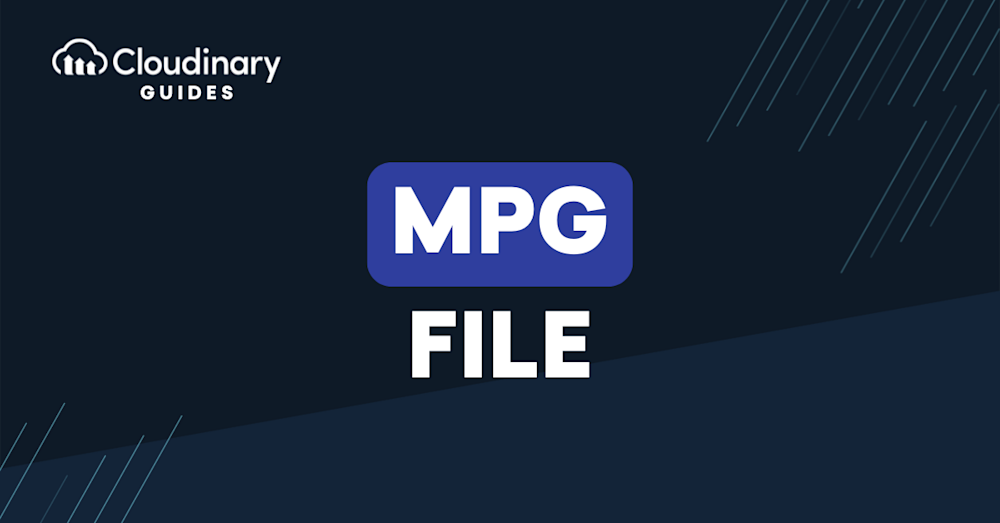What Is an MPG File?
An MPG file, also known as an MPEG file, is a common video file format standardized by the Moving Picture Experts Group (MPEG). You can think of it as a digital container that carries audio, video, and metadata within it, all of which are encoded for optimal delivery and playback. To play this format, you’ll need an an MPG player, which ensures compatibility and smooth performance across devices. MPG files serve various Its purposes translates to anything from storing TV shows and movies to creating a digital footprint of precious family moments and even distributing videos online.
MPG files have been valued for their ability to be downloaded and streamed more quickly compared to some modern formats, thanks to their efficient compression and codec structure. This makes them particularly suitable for early online video distribution and streaming platforms.
In simpler terms, it maintains a decent balance between file size and quality, saving your valuable storage space without drastically sacrificing visual or audio quality. Its high adaptability has made it a prevalent choice among content creators and consumers, powering numerous media player applications, streaming platforms, and more.
Why Are MPG Files Important?
MPG files are crucial in the digital media landscape for several reasons:
- High Compression Efficiency – MPG files utilize lossy compression algorithms, significantly reducing the file size while maintaining decent video and audio quality. This makes them suitable for efficiently storing and transferring video content, even with limited storage space or bandwidth.
- Broad Compatibility – MPG files are widely supported by various media players, video editing software, and streaming platforms. Their compatibility makes them easy to share, distribute, and play on different devices and platforms.
- Suitable for Streaming – The compression efficiency of MPG files makes them ideal for streaming video content over the internet. It enables smooth playback, even with fluctuating bandwidth, allowing users to enjoy uninterrupted streaming experiences.
- Editable and Convertible – MPG files can be edited using video software, and if needed, they can be converted into modern formats like MP4. However, converting them to other codecs may result in some loss of video quality.
The Pros and Cons of MPG Files
In the digital landscape, MPG files stand out for their reliability and efficiency, but, like any format, they come with their own set of strengths and weaknesses. Understanding these can help you make informed decisions whether you’re developing software, streaming content, or just organizing your media library.
Pros:
- Compatibility – MPG files are nearly universally compatible, meaning they’re supported by a wide range of software and devices out of the box.
- Compression – They offer impressive compression capabilities, making them smaller in size without a significant loss in quality, ideal for saving bandwidth and storage.
- Quality – Despite the compression, MPG files maintain a good balance between file size and video quality, ensuring a pleasant viewing experience.
- Faster Streaming and Downloads – The efficient compression algorithms in MPG files enable quicker downloads and smoother streaming, which was particularly advantageous in the early days of online video distribution.
Cons:
- Older Codec – The technology behind MPG files isn’t the newest, which may lead to compatibility issues with certain modern encoding and processing techniques.
- Limited Features – Compared to newer formats, MPG files lack some advanced features like support for 4K resolutions or higher dynamic range (HDR) content. They also lack built-in functionality for subtitles and additional data streams, which more modern formats like MP4 offer.
- Variable Quality – The quality of MPG files can vary significantly depending on the compression level chosen, sometimes making it a balancing act between file size and visual fidelity.

How to Open MPG Files?
Opening MPG files is a straightforward process. You can use various media players, such as VLC Media Player, Windows Media Player, or QuickTime Player, to play MPG files. These media players are equipped with the necessary codecs to decode and render the video and audio data stored within MPG files. Simply double-clicking the MPG file, or using the media player’s open file option, will begin playing the MPG file.
Conclusion
MPG files have significantly contributed to the efficient storage, transmission, and playback of video content in the digital media landscape. Their high compression efficiency strikes a balance between file size and video quality, making them compatible with a wide range of devices and platforms. For those needing more flexibility, a video converter can adapt MPG files for different video formats or optimize them for specific devices.
While MPG files lack the advanced functionality of modern formats like MP4, they remain a reliable option for legacy systems and certain workflows. If needed, converting MPG files to more modern formats can improve compatibility, though some quality may be sacrificed.
Although MPG files use lossy compression and offer limited editability, they remain popular for streaming and distributing video content. By understanding the nuances of the MPG file format, you can fully utilize its advantages and make informed choices while dealing with video files.
Join thousands of businesses transforming their digital asset management with Cloudinary. Sign up for free today!
In addition, you can try our latest image compressor tools:
- Compress image to 1mb
- Compress image to 2mb
- Compress image to 10kb
- Compress image to 15kb
- Compress image to 20kb
- Compress image to 25kb
- Compress image to 30kb
- Compress image to 40kb
- Compress image to 50kb
- Compress image to 60kb
- Compress image to 70kb
- Compress image to 80kb
- Compress image to 90kb
- Compress image to 100kb
- Compress image to 150kb
- Compress image to 200kb
- Compress image to 250kb
- Compress image to 300kb
- Compress image to 400kb
- Compress image to 500kb



